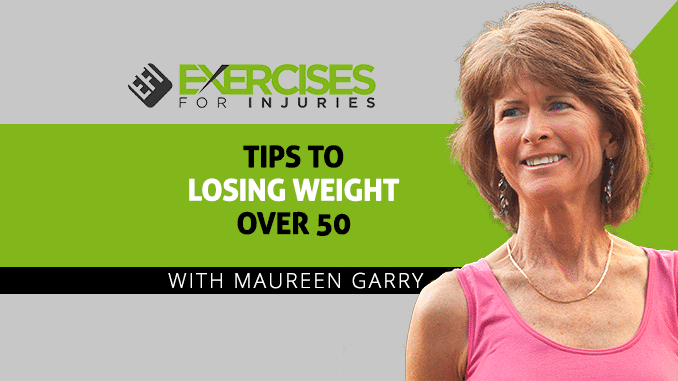
Today, I have another video interview for you. Our guest today is Maureen Garry, a fitness and nutrition expert from Hawaii. Watch the video interview below and learn more about her journey in overcoming obstacles to health, including losing weight over 50.
Enjoy!
Rick Kaselj, MS.
CLICK HERE to watch the YouTube video.
In the above interview, you will discover:
- Maureen Garry’s journey to overcoming chronic fatigue syndrome
- The parasite that leads to chronic fatigue syndrome
- Effective ways of addressing health issues
- How did she discover the tools and strategies for losing weight at 50?
- Maureen’s best nutrition and exercise tips for weight loss
I hope you enjoyed the interview.
If you want more information on Maureen Garry, you can visit her at FlatBellyBreakthrough.com.
Take care, and have a great day.
Rick Kaselj, MS
Check out the transcript below if you cannot watch the video interview.
Rick:
Hey! This is Rick Kaselj from exercisesforinjuries.com. Today I have another interview for you, and it’s with Maureen Garry. Maureen Garry’s a fitness and nutrition expert from Hawaii. These days she focuses on women over 40 but has helped men and women of all ages lose fat and inches. She’s recently created a program called the Fat Belly Breakthrough that brings the latest nutrition and exercise research together with proven ways to change unwanted behaviors. Maureen has overcome many obstacles along the way to being fit and healthy, which fuels her desire to help others. Her toughest battle was figuring out why she had what doctors called chronic fatigue syndrome and how after 14 years of steady decline, she fought her way back to health. Today, Maureen will show you how to use these tools to restore your health.
Maureen:
Thank you, Rick. It’s good to be here, and it’s really good to talk to you again.
Chronic Fatigue Syndrome
Rick:
Yes. So, maybe you can expand on your story and how that obstacle of the label that the doctor gave you, chronic fatigue syndrome, and what you did to overcome that label?
Maureen:
My story starts way back as a kid. I was a chubby kid who grew up knowing how people treat chubby kids. It isn’t good. So in high school, I said, “No more. I’m done. I’m going to lose this weight,” and I did. I got pretty extreme. I started eating very little, just cutting the calories way down.
That’s all we knew how to do back then. It was like cutting calories, and then I started running, and I burned calories and cut them, and I ended up losing 30 pounds in the summer, which was awesome. I changed my social life completely, but unfortunately, I didn’t do it very well because I became anemic and tired my hair was falling out.
It was a bad way to lose weight, and I wasn’t healthy. So, I decided in college to learn how to be healthy, and that’s why I got an athletic training degree because that is what you do with athletes. You bring them back to optimal health and performance if they’re injured. So that was exercise and diet.
So I became super healthy myself. I worked out all the time; I ate a ton of good food; I felt awesome, strong, really lean, thinking this is how it will be forever, right? But over the years, I changed careers; I got into great clinical research and loved it. But even before that, I was working at Stanford’s Heart Disease Prevention Program, teaching the style that I learned in school, which is the laws of cardio and the low-fat diet, which we know has not gotten us into a very good position now.
Our country is in this horrible obesity crisis. That’s where I left the fitness world and got into device research; that was my knowledge. Well, I got increasingly sick over the years and couldn’t figure out why because here I was doing everything “right,” but I just got worse and worse fatigue. And I got diagnosed with this thing, part fatigue and having to take time off from work, well put on disability. And I was motivated. I just wanted to figure this out. It was like, “I’m not going to live my life this way.” This isn’t very pleasant.
So I turned every stone; I hung out in the Stanford Medical Library, trying to figure this out. I got journals; I got newsletters; I got books. I went to doctor after doctor, had exploratory surgery, and did everything possible. And finally, I figured, “No one’s ever tested me for parasites.” So, I found the best doctor in the area and drove 200 miles to see her. She sent these lab tests off to another state that only does parasite tests. And lo and behold, that was my problem.
So, that journey taught me that you need to be very, very motivated. If you have a big obstacle, you got to know your “Why.” Mine was very clear to me. That energy was awful; I didn’t want to live with that; I would do anything to get back to health again how I used to feel. And I think that is what I try to get women to do with how they will change.
Usually, we start with the weight. That’s what I’m doing right now. How can we change? What’s going to motivate you? What’s your big “Why”? And how can we get at that? Then give you the right tools because once you find them in the “Why” and the “What you’re aiming at,” then you implement all the tools that are proven to work. And these are the things now that I’ve learned how to use.
The new tools, not the old style, the long, slow, boring cardio and the low-fat diet. It’s the new stuff. We’re a special age group that isn’t very well served. There are a lot of male trainers, there are a lot of younger female trainers, and this age group I’m talking about doesn’t emphasize us much. So, this is where I’m trying to get women to get more educated and understand how to deal with their hormones at this time.
Parasites on your Chronic Fatigue Syndrome
Rick:
Awesome. Now, just expanding a little bit, how did you know that it potentially could be parasites that were leading to your chronic fatigue syndrome?
Maureen:
It was reading everything. I read so much and had this one newsletter that ripped me off. I just read everything, and this parasite came up several times. Then I thought I better check this out, and I contacted the person who wrote the article and asked for recommendations around Northern California. She took me out to the Central Valley, and that’s how I found it.
Rick:
That brings up a big point. It’s come up a lot when it comes to these interviews that the number one person who cares most about your health is you and that you need to take bold action when it relates to your health. And that’s exactly what you did. And then, what was the treatment? In a basic way, what was the treatment for the parasite issue?
Maureen:
As soon as I started feeling good, I got pregnant. The basic treatment was three different drugs and cycled two times. So it took me several months. And then, after that, I went to a special doctor who was a rebuilding doctor and was all through on nutrition and supplements, and different modalities, acupuncture, and we did all kinds of things to build me up again because I was just so depleted. That took a long time.
The Biggest Things You’ve Learned from it.
Rick:
Now, you overcome that chronic fatigue syndrome. Now when it comes to your healthy lifestyle or fat loss journey, there’s probably been certain times where there’s been ups and downs. What do you think is the biggest thThingou’ve learned from all those ups and downs, and how can it end up helping other women?
Maureen:
The unifying thing is knowing the “Why” and having the right tools. I had weight issues. And I didn’t have the right tools. The tools I was using were not getting me healthy. We didn’t know that the parasite was the issue, right? So we identified it, and then we found the right tools: drugs, rehabilitative nutrition, and all the other things. So that’s what I found is that, once you identify your target and then use the right things. Get your accountability, get your deadline, and get all your environment in place.
Overcoming Tough Times
Rick:
Awesome. And then there’s been other tough times in your life, and how have you overcome those tough times? Kind of explaining what your goals were at that time. What were you shooting for, and what were some of the tools you used to overcome those tough times and obstacles?
Maureen:
Tough times are like back pain and trying to exercise with back pain. And this was yet another thing where I did what I thought was right, and I had to go to the right specialist that I found out through working the network.
The one person with the weird thing seemed to be working for back pain. And when I went to her, she’s a physical therapist, and she said, “Not everyone does this,” but I found it worked really well and ended up working. It shows you again that you must be motivated and sometimes search out unusual things to overcome these challenges.
Losing Weight Over 50
Rick:
How did you discover the different types of kind of tricks and strategies, and tools when it comes to losing weight in your 50s?
Maureen:
That was weird because ETR, Early To rising, you know about this period. They had this contest that they did, and it was healthy, wealthy, wise, and I won one of the categories in the wisdom category, and I won money.
I improved my life and got paid for it, which is good! And then turbulence training had the same kind of thThinghich as weight loss, and I thought, “Well, I’ll give it a shot.” I wasn’t convinced because, in my mind, I had to go back to this long exercise, this low-calorie diet, and the stuff I did a long time ago.
So when I learned what the new stuff was by being in that contest, I was into the mix again, I was into the current fitness talk, and I discovered the new stuff, which got me back into it. This is so new that it hasn’t made it out to the mainstream. I don’t think women know this stuff. That’s why I’m in it now.
And the way I came upon it was trying just to win a contest to win some money and to get into this group for years and years; it was membership. I wasn’t even looking for new information; I found it, and now I’m just charged about it.
Older Adult on Working Out
Rick:
Awesome. I think that comment is like losing weight in your 50s; many people wouldn’t think about that. When you’re younger, in your teens or 20s, you look at your parents or grandparents like, “Ah, you guys don’t care, you guys don’t need to worry about your weight. You’re .old.”
But I think everyone faces different challenges with time and age. I know in my 40s, I know I can’t do what I did in my 20s. I can’t live that way. If I want to live that way, I thrash my body, so I always need to change and improve as I age. And even with people in their 50s, 60s, and I know I have listeners and readers in their 70s.
A reader just emailed me, saying he’s had difficulty working out since he hit 70. Who would recommend a 70-year-old to be working out? It’s awesome that they’re working out in their 70s because it ends up being tons of benefits.
And as you kind of with every decade, your strategy needs to change, your tools need to change, and then also the science ends up changing with time. What we knew ten years ago or 20 years ago is different from what we know now.
Maureen:
That’s why science is so great. It’s great for wimps because you can always say, “Well, I reserve the right to change my mind based on science.” You can never be wrong. You can be current.
Health and Fitness Tips
Rick:
Yes, exactly. And it seems like things go through cycles, especially with health and nutrition, and even like some of the recommendations, we made in the 80s. Now you look, and you’re like, “Oh, those are just bad nutritional recommendations compared to what we know now.”
Now, I want people to listen to or watch this interview and come up and leave with some solid health and fitness tips. So, what are some of your best nutrition and exercise tips with which people can leave this interview?
Maureen:
Super simple. The first thThingou want to start with is to increase your protein intake. Because I find across the board, unless people are savvy, they don’t eat enough protein for weight loss. You can eat a protein level for maintenance, and then there’s an optimal protein level for weight loss and a lot higher.
And the reason is that protein is so satisfying you’ll end up spontaneously eating many of your calories just because you have a higher protein content. So in this one study, people ate a high protein diet. And they spontaneously ate 441 calories on average less per day on their own.
They tried to control nothing, changed nothing, and were fully satisfied. So, it’s got this incredible satiety value, and that’s why you bump it up. I tell people 20 grams at least four times a day. That’s kind of hard to do.
That’s why I recommend protein powders because they’re so convenient. You can take it for snacks; you can run out the door. And go to work with your protein powder and just shake it up. So, high protein. And I also tell people vegetables at every meal, including breakfast which you know they say, “I don’t want broccoli for breakfast.”
For your guide to the best foods to heal your body, check out The Best Foods that Rapidly Slim & Heal in 7 Days here!




